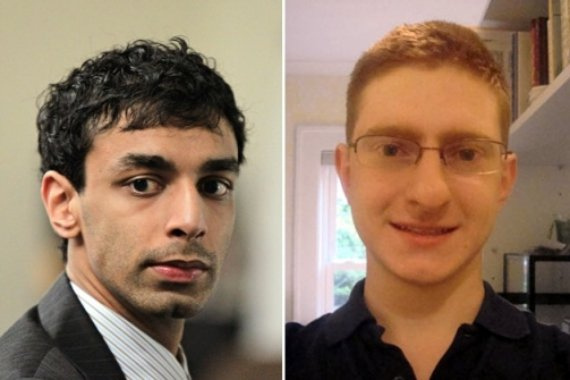Hate Crimes And The Rutgers SpyCam Case
Dharun Ravi was convicted of bias intimidation toward Tyler Clementi. It's not at all clear that he should have been.
In September 2010, a saga began with the tragic suicide of Rutgers University freshman Tyler Clementi under circumstances that, at least initially, seemed to suggest that he had been harassed to the point of suicide by his college roommate, Dharun Ravi. Ravi had allegedly used a computer webcam to spy on Clementi in an intimate encounter and broadcast it on the Internet. As it turned out, the evidence that was developed as the case proceeded to trial was much different from the initial reports. Nonetheless, Ravi did go to trial earlier this month and, on Friday, the saga came to an end with Ravi’s conviction:
NEW BRUNSWICK, N.J. — A former Rutgers University student was convicted on Friday on all 15 charges he had faced for using a webcam to spy on his roommate having sex with another man, a verdict poised to broaden the definition of hate crimes in an era when laws have not kept up with evolving technology.
“It’s a watershed moment, because it says youth is not immunity,” said Marcellus A. McRae, a former federal prosecutor now in private practice.
The student, Dharun Ravi, had sent out Twitter and text messages encouraging others to watch. His roommate, Tyler Clementi, jumped to his death from the George Washington Bridge three days after the webcam viewing, three weeks into their freshman year in September 2010.
The case set off a debate about whether hate-crime statutes are the best way to deal with bullying. While Mr. Ravi was not charged with Mr. Clementi’s death, some legal experts argued that he was being punished for it, and that this would result only in ruining another young life. They, along with Mr. Ravi’s lawyers, had argued that the case was criminalizing simple boorish behavior.
But Bruce J. Kaplan, the prosecutor in Middlesex County, applauded the jury for sending a strong message against bias.
“They felt the pain of Tyler,” he said.
Mr. Ravi, 20, wearing a dark suit over his slight frame, sat expressionless as the jury forewoman read the verdict on the first count, of invasion of privacy. But he seemed surprised when she pronounced him guilty on the next charge, of bias intimidation. His eyes popped and he quickly turned his head from the jury. As he left the courtroom in a swarm of television cameras, his mother clutching his arm, he looked straight ahead and said nothing.
The jury also found him guilty of lying to investigators, trying to influence a witness and tampering with evidence after he tried to cover up Twitter and text messages inviting others to join in the viewing.
Some of the charges carry penalties of 5 to 10 years in prison. Mr. Ravi has surrendered his passport; prosecutors said he could face possible deportation to his native India, but that decision would be left to immigration officials. Judge Glenn Berman set sentencing for May 21.
(…)
Reflecting the difficulty of defining hate crimes, it had taken the judge more than an hour simply to instruct the jury on the questions they had to answer to reach a verdict.
The jury concluded that Mr. Ravi had not knowingly or purposely intimidated the men when he watched the first time, on Sept. 19, 2010.
But it found him guilty of the charge because Mr. Clementi “reasonably believed” he had been made a target because he was gay.
The prosecution had pointed out that Mr. Clementi had checked Mr. Ravi’s Twitter feed — where Mr. Ravi told others he had seen his roommate “kissing a dude”— 38 times in the days after the first webcam viewing. Records showed that Mr. Clementi had gone online to request a room change, and a resident assistant testified that Mr. Clementi had complained to him.
It’s the last part of the jury verdicts, the determination that his actions were motivated by bias and an intent to intimidate Clementi that have aroused the most controversy. As I’ve already noted, the actual evidence in this case as much different from what popular belief had come to be after the tragedy of September 2010, the most important difference being the fact that Clementi, while he was gay, was not closeted in any sense of the word either to his family, his friends, or while he was at college. Additionally, there didn’t seem to be any evidence that Ravi himself was biased against gays at all. Perhaps most important, though, there’s the question of how the jury actually could have concluded beyond a reasonable doubt that Clementi “reasonably believed” he was being targeted because he was gay. That last point will no doubt be a subject of the inevitable appeals that will follow this verdict, but it also plays into the general discussion about hate crime laws in general that this case has inspired.
In a piece at Democracy In America, for example, Economist correspondent “R.M.” finds the verdict troubling:
For many this will be seen as a victory against homophobia and cyberbullying. But others will see it as overkill by prosecutors bent on avenging the death of Mr Clementi. Despite holding nothing but contempt for Mr Ravi, I tend towards the latter interpretation. Society’s harsh moral judgment of Mr Ravi could not be adequately reflected in the law, nor could the law properly account for Mr Clementi’s suicide. So prosecutors piled bias intimidation charges on top of the more appropriate spying and tampering ones, essentially doubling the possible sentence, in an effort to express the public’s disdain for the defendant and somehow balance Mr Ravi’s callous acts with Mr Clementi’s tragic death.
(…)
Certainly Mr Clementi’s death and the outcry that followed affected their judgment, as it will affect the way many view this case. I may find it excessively harsh to impose a ten-year jail sentence on a student for spying on his roommate and being a jerk. You may find it appropriate for the man who pushed a confused teenager to his death. We can disagree, but the law is meant to be administered without emotion, and it seems to have not been in this case. Mr Ravi was not charged in Mr Clementi’s death, but there is little doubt that part of his sentence will be punishment for it.
Jacob Sullum meanwhile notes the problems with New Jersey’s law that likely led to Ravi’s convictions for what likely may have been a “hateless hate crime”:
As for finding Ravi guilty of an unintentional, hateless hate crime, as the jury did with regard to the September 19 incident, the concept only compounds the injustice of imposing extra punishment for crimes motivated by bigotry. Under New Jersey’s law, bigotry is not even necessary. Assuming the underlying offense (in this case, invasion of privacy) was intentional, there need not be any evidence that the intimidation was. Surmising how Clementi felt in this situation based on the available evidence—in particular, distinguishing between anger and intimidation—is fraught with uncertainty, and the judgment as to whether his imagined feelings were reasonable is even harder to make. In a case like this, where the victim cannot testify about what he was thinking and no one else knows, these elements have reasonable doubt built into them.
All of this raises the question of whether hate crime laws should even exist. Many, including people like Andrew Sullivan argue that they should not, that they pose the severe risk of infringing on freedom of speech and thought and that making “hate” a crime puts the entire concept of crime on its head. Advocates of the laws, on the other hand, argue that society must send a message to those who commit crimes because of their bias against a group. There is some merit in this argument, I will admit, and at the very least I would argue that it makes sense to consider bias motivations as an enhancement factor at sentencing even if they aren’t the basis for a separate crime themselves. At the same time, though, is there really a difference between someone who kills for money, or because they dislike someone personally, and someone who kills another person because of their race, religion, or gender? Does it matter more if someone gets knocked unconscious because of their sexual orientation than if it happens because an assailant simply wanted to take their wallet? The crime is serious regardless of the reason it was committed and, in fact, motive is not an element of a crime that prosecutors generally have to prove at trial.
Getting back to this particular case, it does strike me that R.M. has a point. Ravi was, without question, a jerk for what he did but it’s not at all clear that what he did arises to the level of a crime that he should spend a decade behind bars, and possibly be deported, for. Had Clementi not died, it’s unlikely that Ravi ever would have been charged with a crime at all. Either he and Clementi would have worked out their differences, or they would have gotten new roommates. Does the fact that, for reasons that we can never really know, Tyler Clementi killed himself, mean that Dharun Ravi should effectively be punished for a murder that he didn’t really commit? I’m not seeing the logic behind this verdict at all.







Making a specific hate crime, rather than just leaving it up to the judge to decide during sentencing, insures that the increased punishment is decided by a jury of one’s peers, rather than a single individual. And, since it requires a unanimous verdict, it reduces the likelihood that this increased penalty will be applied when it is not merited.
Yes. Not to the person who got killed, but to society at large.
We have a long history of intolerance and discrimination in this country, and all too often those who victimize minorities get away uncharged (see the current Florida case where George Zimmerman killed an unarmed teenager, and the police have been dragging their feet on the matter, reluctant to charge him). By increasing the penalties when people actually are charged, we restore the average expected jail time for the crimes.
Simply put, if you are 20% less likely to be charged and convicted if you attack a minority but face the same penalty, then the law becomes less of a deterrent. If you are 20% less likely to be charged and convicted, but the penalty is 25% higher if you are, we restore the deterrent value of the law.
This assumes that the law actually is a deterrence, of course.
And, as far as Ravi goes, I won’t weep for him. He screwed up someone’s life, now his life is screwed up. And he serves as a warning to others.
Yes, becuase it’s a form of terrorism. Not terrorism in the 9/11 sense but terrorism in the sense that it’s meant to force the gay community back in the closet. It’s meant to send a message that if your out and proud that your target and that you could be next. Anti-gay people know that they can’t get rid of us, but if they can force us out of the public eye then they can pretend we don’t exist.
While my opinion on sexual deviancy is well-known to you, Doug, it’s not really relevant to the fact that Clementi’s behavior — engaging in an encounter in their shared space without Ravi’s acquiescence should have been dealt with more severely.
Aside from that, “hate” crimes are thought crimes, and should by unconstitutional under the First Amendment. It is the crime which is important, not the hate.
I’m against the idea of “hate crimes.” The crime is the crime, and if necessary the “hate” part can be evaluated at sentencing time. Hate crime is far too close to Thought Crime for my comfort.
As for this specific case, Ravi sounds like a huge jerk, but I don’t think he belongs in jail. Expel him, condemn him, etc. But this? I don’t see how this is the right answer.
Next time, don’t plead “not guilty” to a crime you committed. Dude rejected a plea deal for no reason that I can discern. Plus, he went to jail for more than just the hate crime law.
As for the constitutional argument… given the premise that we agree that congress can make a criminal code that goes beyond counterfeiting and treason, I see nothing wrong with using the criminal code to influence behavior. That’s pretty much the definition of criminal law. The problem with thought crimes is enforcement, not intent. Because in all reality, any criminal law is meant to get you to think a certain way about how to behave in society.
@Console:
(1) The plea deal that was offered would have still required Ravi to plead guilty to a bias crime. Furthermore, you can argue that acceptable the plea may, in retrospect, might have been the rational decision given this outcome, however if someone believes they are innocent they shouldn’t be forced into accepting a plea deal.
(2) I’m not really making a constitutional argument vis a vis hate crime.
@James Young:
Blaming the victim much?
Also has the fact that Ravi agreed to give Clementi the room for the night esc-aped your memory? Something tells me that you wouldn’t be suggesting that Clementi should have been punished if his guest for the evening had been the head cheerleader instead of a man.
As much as I hate what this boy did, I would argue he did not know what the consequences would be. Everyday someone is being humiliated by someone, yes this was cruel but not worth jail time at least this time. Some people are not told if you do this this will happen. In some places if convicted as a felon you will never be able to vote. We all know what happens when we steal , or murder why not something like this. This boys life is ruined forever and if my son was the victim I might feel differently but if I was this boy`s parent I would want some leniency.
Let’s be clear: Ravi wasn’t some casual jerk who used a slur and walked away. He was a dangerous personality, one who was obsessed enough with his roommate that he ended up trying to record him having sex. One doesn’t just end up doing this out of spite.
Deport him. If he leaves the country and promises to never return they should drop all charges.
We have enough homegrown bigots, we don’t need any imported from another country.
@Doug Mataconis:
Heh, you typed the post I had typed up and then deleted (deciding not to engage). It’s nice to know I’m not the only one who falls for such obvious bait from time to time.
Sexual Deviants! Oh my.
I probably agree, but I think I’d put that another way. There has always been some leeway at the sentencing phase for the judge to decide whether the crime should be on the low or high end of the penalty range.* I think any crime against an individual that also is intended to make a larger group feel insecure and afraid should be on the highest end of the spectrum.
Hate as a crime is poppycock IMHO.
*Less so under federal law these days, I know.
@Modulo Myself: “He was a dangerous personality, one who was obsessed enough with his roommate that he ended up trying to record him having sex.”
Given the ease with which college age kids and younger record every second of their lives, I’m not sure how this behavior qualifies as “obsessed”.
Mike
@Vast Variety: “Not terrorism in the 9/11 sense but terrorism in the sense that it’s meant to force the gay community back in the closet.”
I’m not sure it’s been established that Ravi wouldn’t have done the exact same thing if his roommate had been a straight guy who liked banging fat chicks.
Mike
@James Young:
(This isn’t directed at James so much as I’m putting it forward for discussion)
I’m sympathetic to the idea that the “crime” is what matters not the “hate”.
But shouldn’t this argument also apply to “terrorism?” It seems to me that hate crimes are very similar to terrorist acts in that, while both are directed against specific individuals, they are also meant to be “symbolic” of attacks on an entire body of people.
@Vast Variety: Oops… I see you beat me to the question.
I don’t really like Hate Crimes laws for many of the same reasons as Sullivan. On the other hand, my understanding is that they give Federal authorities jurisdiction to bring charges in cases where state and/or local authorities are unable or unwilling to investigate and/or prosecute.
@mattb:
If someone carves a swastika on the tree in front of the house of a Jewish family that just moved into the neighborhood, is that really the same crime that is committed when a guy carves his initials into a tree in someone’s yard?
@mattb: I think you’d have to identify the specific crime. I don’t think “terrorism” is a crime. I think people like Lindh got charged with joining and giving material support to a listed foreign terrorist organization.
Bill Ayers wasn’t charged as a terrorist. I think those were weapons-related charges relating to explosives, but the FBI illegally gathered the evidence.
Is joining the KKK a criminal act? A hate crime?
I haven’t followed this case at all, so I won’t opine on it.
I can say with certainty, however, that I’ve always opposed the notion of “hate crimes.” Pretty much for the precise reasons outlined in the main blog post.
At no point in recorded history, until these “hate crimes” laws became de rigueur, was motive an element of a crime. Motive of course is and always has been relevant to any prosecution, but the recent phenomenon of inserting motives into the prima facie definitions of crimes has turned on its head a millennia or more worth of criminal jurisprudence.
There definitely are 1st Amendment issues with this entire concept of “hate crimes.” There’s a very good argument these laws infringe on freedoms of speech and association and they come damn close in various contexts to thought crime laws.
These laws might also run afoul of equal protection requirements. From the offender’s standpoint they’ll either be subjected to more or to less punishment based upon the characteristics of their victims and not based upon the characteristics of their actions and intentions. Within the purview of “hate crimes” legislation if a straight man without premediation punches a gay man in the head because the former does not like gay people that offender likely will be subject to less punishment than a gay man who in a premediated manner punches another gay man in the head to settle an old debt. How does the state have the requisite “compelling interest” in creating that dichotomy?
Lastly, there is the equivalency factor. If a man shoots his wife in the head to collect on her life insurance that’s 1st degree murder. If a man plans for and then shoots his neighbor in the head because the former thinks the latter is gay that’s 1st degree murder. How is one more egregious than the other? How do you explain to the next of kin of the murdered wife that her murder is considered by the law to be less severe than the murder of the neighbor? Makes no sense whatsoever.
Oops, “premeditation” and “premeditated,” that is.
It didn’t “escape [my] attention,” Doug; I was utterly unaware of it; since I have little interest — apparently, as little as the prosecutors in this case — as to why the little deviant decided to throw himself off of the GW bridge. And what seems to have escaped your attention was the fact that I made no excuses for the actual crime committed. Apparently, your enthusiasm for sexual deviants caused you to ignore that little fact (for instance, would you care about this case at all if homosexuality weren’t involved? Implicit in my point, too, is that Ravi — or, for that matters, Rutgers — might have saved himself much trouble if he had bothered to set boundaries for their shared space.
This is no different that Mr. Johnson’s flag-burning in Texas. If the little creep had been prosecuted for destruction of private property (it was a bank’s flag, stolen from the pole) rather than flag-burning, the ensuing hue and cry would not have ensued.
@James Young:
The only thing I’ll say is in response to this:
The only person who seems to be obsessed with Tyler Clementi’s sex life is you.
@PD Shaw:
I was wondering about that as I wrote the response. Thanks for weighing in.
@swbarnes2:
To play devil’s advocate: why wouldn’t that act fall under existing trespass, vandalism, and intimidation laws.
It seems to me that there are two advantages of “hate crime” laws: (a) to provide victims with a way to “force” prosecution where local authorities are seen to be dragging their feet and (b) to achieve harsher sentences/punitive damages where existing statutes don’t seem to allow for the severity of the situation.
@Barb Hartwell:
A careless doesn’t know the consequences of his actions, but if he runs someone over, he gets charged with vehicular manslaughter.
And then there is the Eggshell Skull Rule.
Ravi may not have intended to cause as much harm as he did, but too bad for him. “I didn’t mean to cause that much harm” doesn’t absolve him. Prison and deportation seems fine.
A careless driver, that is.
@Gustopher:
To be fair, the maximum penalty for vehicular manslaughter in NJ is far less than 10 years
This ties into the broader issue.
Generally speaking there has been a tendency towards making the maximum sentence for a crime the norm where there are sentencing guidelines.
The net result of that is that additional laws become required to “send a message.” And while I’m very sympathetic to the idea of “sending a message” on has to ask to what degree is that a good way of operating.
@mattb:
This is the problem I have with this case. Whatever the actual charges, Ravi’s crime real boils down to Negligent Stupidity and Being A Jerk. I’m not comfortable with the idea that this is worth ten years in prison and, quite possibly, deportation (apparently Ravi is a Resident Alien and not a Naturalized Citizen)
I’m unfamiliar with the sentencing laws in New Jersey so I don’t know how much discretion the judge has here
I think his crime was worse than Negligent Stupidity or Being a Jerk. Attempting to utterly humilate someone goes a step beyond that. That said I do share some concern for the idea of hate crimes in that you could face harsher penalty even if your motives weren’t “hate” driven at all.
Perhaps homophobic bigotry like that expressed by James Young played a part in the jury’s decision…
I know the topic is hate crimes but going beyong that I think what the perp did is criminal and I hope my states has similar laws- 10 years may be a long hitch though.
When our country was founded: there were no hate-crime laws; in some states suicide could be labeled as a felony (in New Jersey it was considered a crime until 1963); oftentimes the crime of homosexuality was punished by death (laws against homosexuality were ubiquitous until the mid to latter part of the 20th century).
We’ve come a long way baby. Thank the Forces Above for the flood of glorious enlightenment. Well, of course, I’m only speaking for myself and my cadre of liberated thinkers; certainly not for Dharun Ravi, his family and his legal team.
With the aroma of freshly administered justice coursing through the breeze, the coming of spring cannot be far away.
Why haven’t college gone to all single rooms in the dorms. I bet if a college went to all single rooms that applications would increase, graduations rates would increase and more students would major in difficult subjects.
Also, why do universities insisit that dorms would be part of the student education instead of housing for students who are trying to learn?
I want to toss something out for discussion.
At my office a few years ago, there was an employee to liked practical jokes. Well-liked by everyone. Some of his jokes were “borderline”, but, to me, just this side of acceptable.
One day he went too far. In a meeting, he jokingly “pulled the chair” to a co-worker sitting down. We were in a carpeted room, so I’m sure he thought, “Ha, the guy will just fall down on the carpet.” These two were good friends, too.
Well, he didn’t pull the chair far enough. The co-worker fell, smashing the back of his head into the chair. Huge gash, immediate loss of consciousness, lots of blood on the carpet, ambulance, hospital stay, concussion, stitches, etc. He missed a week of work.
Needless to say, the Joker didn’t “intend” the outcome, but he very easily could have been responsible for the death of a co-worker.
What, if anything, should have happened to the Joker? After all, he didn’t have any intention of causing anything other than a bit of embarrassment.
Yes, we certainly have…when our country was founded, certain human beings could be treated as property and only white landowning males could vote…glorious enlightenment indeed…
Dr. Rosenberg Speaks Out #2.wmv
Dr. Bernhard Rosenberg addresses the Rutgers University spycam case and bullying on college campuses. Dr. Rosenberg also addresses his likely being let go from Rutgers University because he was too good of a teacher for rutgers to handle.